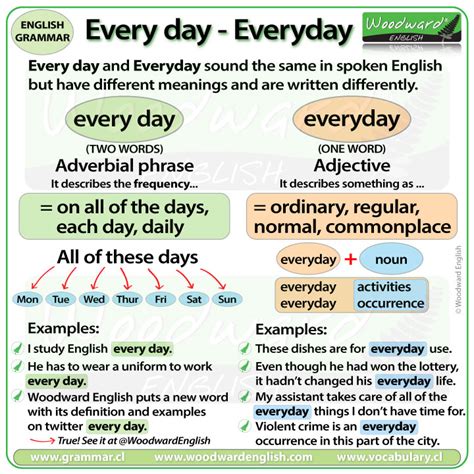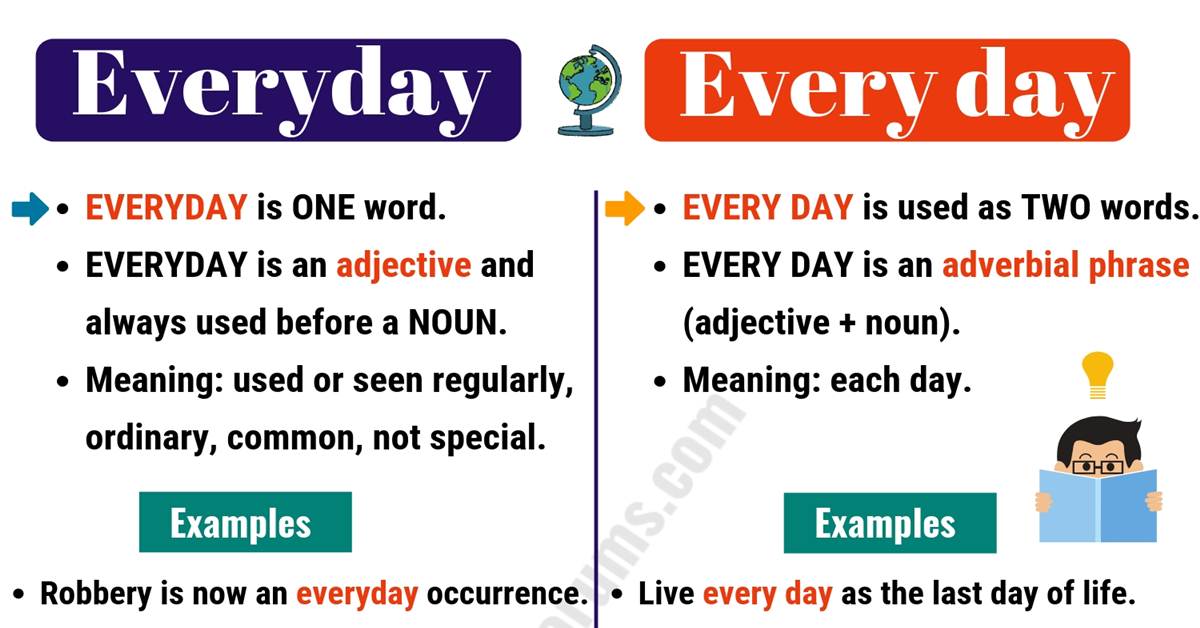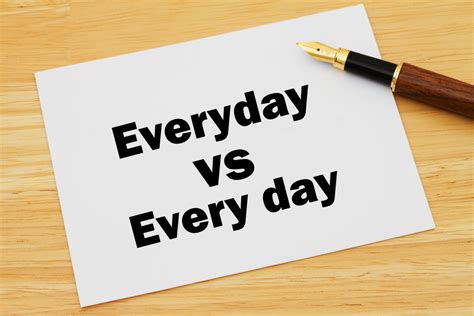Every Day Vs Everyday

The distinction between "every day" and "everyday" is a common source of confusion in English, even among native speakers. Understanding the difference between these two phrases is crucial for effective communication, as they convey distinct meanings. The primary distinction lies in their grammatical function and the context in which they are used.
Definition and Usage

“Every day” is an adverbial phrase that means something happens or is done each day. It is used to describe actions or events that occur daily. For example, “I exercise every day” indicates that the action of exercising is performed each and every day. The phrase is versatile and can be used in various contexts to emphasize the frequency of an action.
On the other hand, "everyday" is an adjective that describes something that is ordinary, routine, or common. It is used to modify nouns and describes the nature or quality of something. For instance, "everyday life" refers to the ordinary or mundane aspects of life, not necessarily implying a daily occurrence but rather the common or usual aspects of it.
Examples for Clarity
To further illustrate the difference, consider the following examples. “I wear everyday clothes to work” means that the clothes worn are ordinary or casual, not that the act of wearing clothes happens every day (although that might also be true). In contrast, “I go to the gym every day” clearly states the frequency of the action.
| Expression | Meaning | Example |
|---|---|---|
| Every day | Something happens each day | I study every day for my exams |
| Everyday | Ordinary, routine, or common | I use my everyday mug for coffee |

Common Mistakes and Clarifications

One of the most common mistakes made by both native and non-native English speakers is the misuse of “everyday” and “every day”. This often happens because the phrases are pronounced similarly, leading to confusion in writing. However, understanding the basic rule that “every day” refers to actions or events occurring daily, while “everyday” describes the quality of something as ordinary or routine, can significantly reduce errors.
Another aspect to consider is the evolution of language. While "everyday" has been traditionally used as an adjective, there are instances where "every day" might seem to function as an adjective in certain contexts, especially in informal writing or speech. Nonetheless, adhering to the standard rules of grammar provides clarity and precision in communication.
Historical Context and Evolution
The distinction between “every day” and “everyday” has historical roots. The term “everyday” originated from the need to describe common or ordinary things, evolving from the phrase “every day” which inherently suggested a daily occurrence. Over time, “everyday” took on its adjective form, distinguishing itself from the adverbial “every day” in both meaning and usage.
Key Points
- "Every day" describes the frequency of an action or event, indicating it happens daily.
- "Everyday" is an adjective used to describe something as ordinary, routine, or common.
- The choice between "every day" and "everyday" depends on the intended meaning of the sentence.
- Understanding the distinction is crucial for clear and effective communication.
- Mistakes are common due to similar pronunciation, but following grammatical rules can reduce errors.
Conclusion and Forward-Looking Implications
In conclusion, while “every day” and “everyday” might seem interchangeable at first glance, they serve distinct grammatical functions and convey different meanings. Mastering the difference between these phrases is essential for precision in English communication, whether in formal writing, casual conversation, or any context in between. As language continues to evolve, understanding and respecting these distinctions will remain vital for effective expression and comprehension.
What is the main difference between “every day” and “everyday”?
+The main difference lies in their grammatical function and meaning. “Every day” is used to describe actions or events that occur daily, while “everyday” is an adjective describing something as ordinary or routine.
How can I avoid confusing “every day” and “everyday” in my writing?
+Avoiding confusion between “every day” and “everyday” can be achieved by understanding their definitions and usage. If you’re describing the frequency of an action, use “every day”. If you’re describing the nature or quality of something as ordinary, use “everyday”.
Are there any exceptions to the rule when using “every day” and “everyday”?
+While there are traditional rules governing the use of “every day” and “everyday”, language is evolving, and contexts may vary. However, in standard English grammar, adhering to the distinction between the adverbial “every day” for frequency and the adjectival “everyday” for describing quality provides clarity and avoids confusion.
